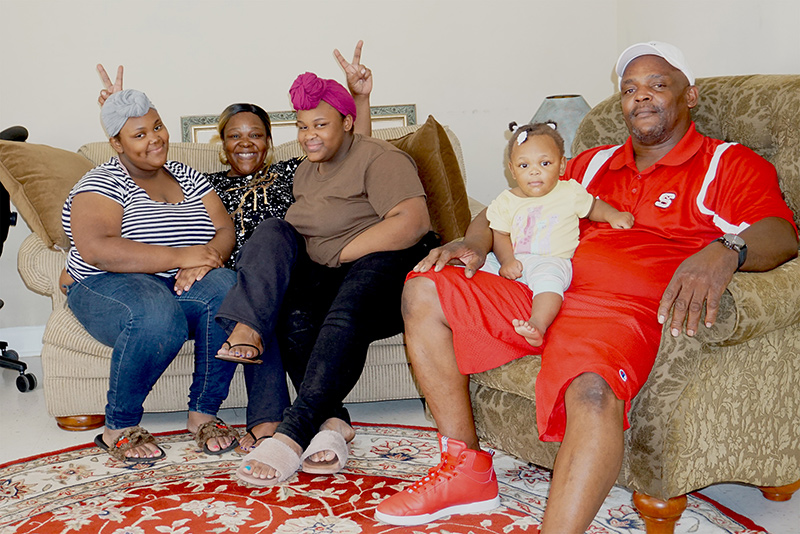
Tommy and Shelia moved their family into their CASA apartment in May. Before they arrived, they had been living in a hotel room with one bed. Now, they live in a two-bedroom apartment in a community for families with children in Raleigh.
“At one time we had a nice apartment,” Tommy says. A serious accident at work left Tommy permanently disabled. “I was making good money and we had nice places, nice cars, everything. And then I had an accident and we were at the bottom.”
After Tommy’s injury, the family used up their savings trying to stay in their apartment. They moved into a trailer in bad condition, Shelia says. “When you’re in that situation, people will take advantage of you.” They paid $1,000 a month for the trailer with no water heater and floors that needed repair, hoping the landlord would make the repairs he promised. When he didn’t, the family moved again.
“We had nowhere to go,” Shelia says. “We went to different hotels, stayed with different family members, we even had one night when we slept in the car.” That night in the car was a turning point for Tommy and Shelia. “I think it broke us down to a certain point,” Shelia remembers.
So the family decided to rent a hotel room by the week and hope for something better. “It was so crowded, and the kids couldn’t move around,” Tommy says. They looked for an apartment, but most communities required a deposit and proof that they earned three times the rent. A mechanic for thirty years, Tommy was picking up work wherever he could find it when his health allowed, “just for food for the family.”
“It was awful, trying to keep the keep the kids fed,” Tommy says. “It made me feel like less than a man because I couldn’t take care of my family and my kids like I wanted to. It was hard – trying to get gas, clothes, and trying to get them back and forth to school with school supplies.”
Shelia says the family tried to find a shelter where they could stay until they were back on their feet. “But, it’s not as easy as saying can we stay at a shelter. Some shelters don’t take you if you’ve got teenage daughters, and some shelters don’t take you if it’s more than three or four people. But we tried.”
For their youngest daughter, who lives with mental health concerns, moving from place to place and staying in the cramped hotel room was especially difficult. “It felt so good when I helped make her bed up in our new place,” Tommy smiles. “Nothing makes you feel better than when your kids are happy. I felt a lot of her stress and her pain when we were living here and there and some nights we were struggling to get something to eat. And now we’re here and she seems happy. The smile on her face – it’s like a million bucks. Like a million bucks.”
“I’m most happy about this apartment right now because we’ve got a place to live and we can afford it,” Tommy says. “Having all these people standing behind us – we thought it was all over, we didn’t know how we would come through. It’s life changing to know that someone cares. We’ve got a place to live and the kids can know that when they get out of school, they’ve got a place to come home to, a place we can call our own.”
“There are so many different little changes,” Shelia says. “The kids worried about not having the money to pay the hotel. They worried about CPS taking them away from us because we couldn’t keep it going. They’d go to school not knowing if they were going to come home to the same place or a different place. But now, my daughters are really happy. They make plans now. Like they’re dreaming again. Now it’s like they’ve got hope for their future. I’m so happy.”
“I know this for sure,” Shelia says. “I couldn’t tell you how much this has changed our lives. We went from a void to a filled space. Thank you, thank everyone, like, a million thanks.”


